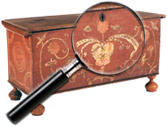|
|
Edward & Henry T. Anthony
Edward Anthony trained as a civil engineer before turning to photography. He was educated at Columbia University where he studied science. Anthony took an interest in photography from the time it was first introduced to the U.S. in 1839. He studied under one of the pioneers of American photograph, Samuel Morse. Helped by his sound scientific background Anthony soon became an accomplished Daguerreotype photographer.
By 1842 Anthony was [...] Click here to continue reading.
Cartes De Visite
The carte de visite, or visiting card as it is loosely translated, truly opened up photography to the masses. It should be noted that carte de visite is frequently abbreviated in catalogs as “CDV”. This photographic version of the visiting card followed the popular trend in fashionable society to leave a calling card after a visit. This new format consisted of small paper albumen prints mounted on card.
The albumen process [...] Click here to continue reading.
Magic Lanterns & Slides
The magic lantern is an early form of slide projector using a focusing lens and light source to project an image. The images are on glass and either hand-painted, lithographed or photographic.
The earliest forms of magic lanterns appeared in the 1400′s and through development they were transformed into the lanterns we recognise today. Because of their age, unlike other forms of collectible photographica, it is impossible to say [...] Click here to continue reading.
Megalethoscope
A room-sized viewing device, the Megalethoscope was invented circa 1860 by Venetian optician and photographer Carlo Ponti. Up to five feet wide, the device showed travel and other photographs using daylight magnified by a large lens. The views were up to twelve inches in width.
Keystone View Company
Stereographs or views are paired images of two slightly different views. These images are created with a two-lens camera. The lenses are offset at about the same spacing as with the distance between human eyes. The dual-lens camera produces paired-stereographic negatives. Load a stereograph into a stereo viewer and the user can see the paired views as if they were a single photograph. Consequently, the stereoscopically combined photographs transform into a [...] Click here to continue reading.
|
Recent Articles
- Charles Alfred Meurer – American Artist & Tromp L’Oeil Artist
- Sendak, Maurice – American Artist & Writer
- Godie, Lee – American Artist
- Davis, Vestie – American Artist
- Bartlett, Morton – American Artist
- Mackintosh, Dwight – American Artist
- Evans, Minnie Jones – African-American Artist
- Mumma, Ed (Mr. Eddy) – American Artist
- Nice, Don – American Artist
- Savitsky, John (Jack) – American Artist
- Gordon, Harold Theodore (Ted) – American Artist
- Dial, Thornton – African-American Artist
- Doyle Sam – American Artist
- Johnson, Lester Frederick – American Artist
- Finster, Howard – American Artist
|
|
